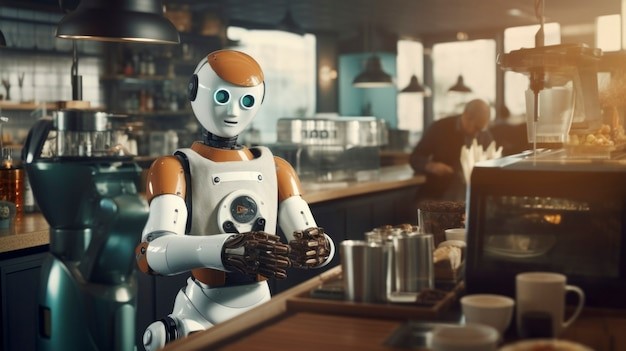By Asenath Were
In 2021, ChatBott (ChatGPT) was introduced, which revolutionized employment and social life. Technological advancements have introduced AI robotics that are operating restaurants such as Cali Express by Flippy in California.
Emmanuel Isabirye, a lecturer from the Department of Computing and Technology, remarked that the coming generation, often characterized as ‘Generation Z’, is a cohort coming of age in a rapidly evolving digital era, making their needs diverse.
According to him, they are inheriting a world grappling with global challenges, so AI plays a pivotal role in mitigating these problems.
“The next generation will enjoy AI-powered adaptive learning platforms that will cater to specific individual needs, thereby addressing variations in learning pace and style. Intelligent tutoring systems will provide targeted support, identifying and remedying specific challenges faced by learners.” Isabirye commented.
Martha Wamala, a business administration student in her second year, said AI has eased so many things, such as research, because it is faster, easier, and gives more details when she is doing research.
To Wamala, AI reduces cases of human error through the already-programmed mechanisms of AI equipment. “In homes, one can just set up an AI timer to regulate your cooking time compared to when you are doing it as a human being; you can set something in the oven and forget it there. She elaborated.
Kelly Lambda, a SWASWA student at UCU, emphasized that AI will improve healthcare because it assists in medical diagnosis, drug discovery, and personalized treatment plans, leading to better health outcomes.
“AI algorithms can analyze medical images like x-rays, CT scans, and mammograms with high accuracy, aiding in early detection and improved diagnosis of diseases like cancer,” Lambda said.
However, as Stephen Hawking told the BBC, “The development of full artificial intelligence could spell the end of the human race… It would take off on its own and re-design itself at an ever-increasing rate. Humans, who are limited by slow biological evolution, couldn’t compete and would be superseded.”
Connected to the above, thoughtful scrutiny of the benefits of AI applications for the next generation prompts consideration of their potential challenges.
Isabirye says, “Key issues such as job displacement and ethical dilemmas underscore the importance of imparting an objective understanding of AI implications.” He added that the concern of job displacement due to automation is substantial.
“Whereas AI creates new opportunities, certain traditional roles may become obsolete, demanding a proactive approach to reskilling and upskilling the workforce.” He commented.
Isabirye elaborated that balancing the benefits of connectivity with the potential disadvantages, such as screen addiction and loss of face-to-face communication skills, presents a delicate challenge to the next generation socially.
“In the context of academic circles, the integration of AI education necessitates the cultivation of a discerning approach to technology that will cater to potential scenarios where AI might be misused, such as students relying on it to write assignments on their behalf,” Isabirye remarked.
In addition, Wamala says, “In time, AI will slow down the way we think, the way we use our natural knowledge, and cause a backslide.”


